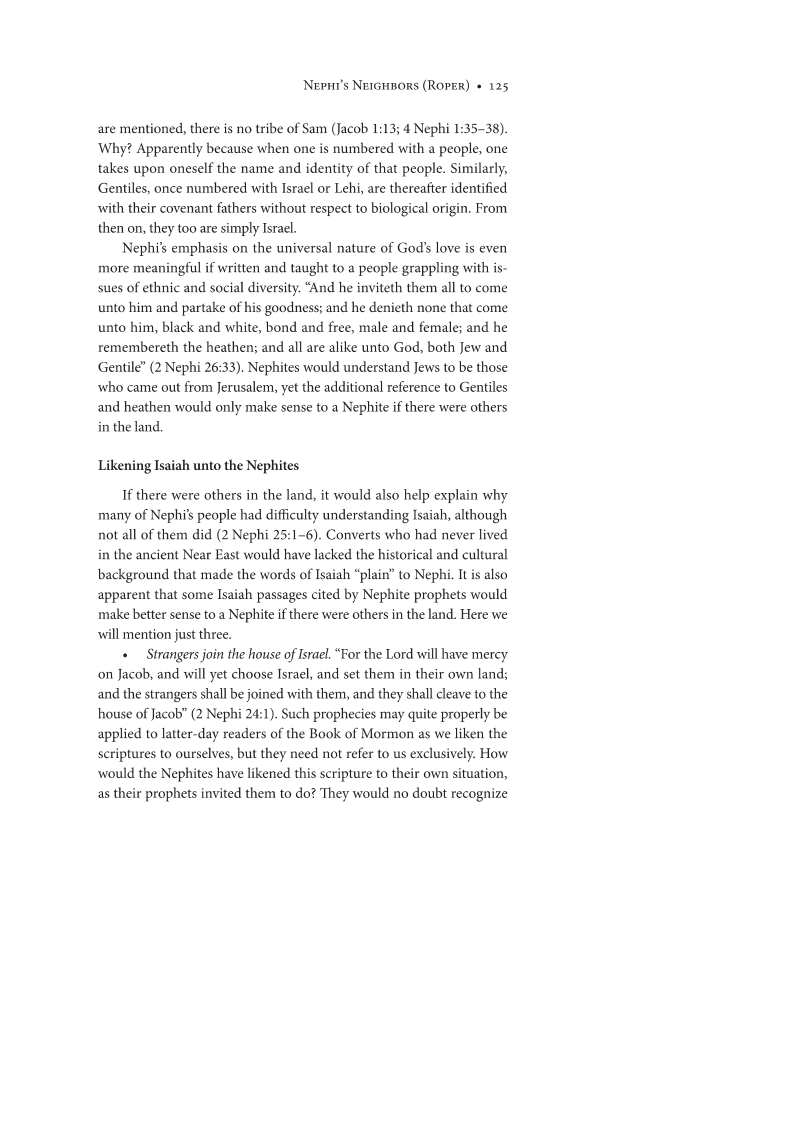Daniel C. Peterson and Matthew Roper discuss plausibility of Book of Mormon "horses" being Mesoamerican tapirs.
- Type
- Academic / Technical Report
- Source
- Matthew Roper LDS
- Hearsay
- DirectSecondary
- Reference
Matthew Roper, "Nephi's Neighbors: Book of Mormon Peoples and Pre-Columbian Populations," Review of Books on the Book of Mormon 15, no. 2 (2003): 125-127
- Scribe/Publisher
- Foundation for Ancient Research and Mormon Studies
- People
- Matthew Roper
- Audience
- Latter-day Saints, Reading Public
- Transcription
Likening Isaiah unto the Nephites
If there were others in the land, it would also help explain why many of Nephi’s people had difficulty understanding Isaiah, although not all of them did (2 Nephi 25:1–6). Converts who had never lived in the ancient Near East would have lacked the historical and cultural background that made the words of Isaiah “plain” to Nephi. It is also apparent that some Isaiah passages cited by Nephite prophets would make better sense to a Nephite if there were others in the land. Here we will mention just three.
• Strangers join the house of Israel. “For the Lord will have mercy on Jacob, and will yet choose Israel, and set them in their own land; and the strangers shall be joined with them, and they shall cleave to the house of Jacob” (2 Nephi 24:1). Such prophecies may quite properly be applied to latter-day readers of the Book of Mormon as we liken the scriptures to ourselves, but they need not refer to us exclusively. How would the Nephites have likened this scripture to their own situation, as their prophets invited them to do? They would no doubt recognize the great mercy of the Lord in bringing them out from Jerusalem and saving them from destruction, and they would also see the Lord’s hand in setting them in a new land of promise where they could establish Zion. Significantly, this prophecy would also suggest to the ancient audience that there were “strangers” in the land who had joined or would join with them in accepting the teachings of Nephi and could be numbered with the house of Jacob.
• Temples and people. “And it shall come to pass in the last days, when the mountain of the Lord’s house shall be established in the top of the mountains, and shall be exalted above the hills, and all nations shall flow unto it. And many people shall go and say, Come ye, and let us go up to the mountain of the Lord, to the house of the God of Jacob; and he will teach us of his ways, and we will walk in his paths; for out of Zion shall go forth the law, and the word of the Lord from Jerusalem” (2 Nephi 12:2–3, quoting Isaiah 2:2–3). While there are several ways of reading this passage, the Nephites would likely have thought about their own temple, recently constructed at the direction of Nephi “after the manner of the temple of Solomon” (2 Nephi 5:16). This was the temple at which Jacob taught (Jacob 1:17; 2:11) and likely the one at which Nephi’s own teachings to his people and his quotations of Isaiah were presented. Isaiah’s reference to “many people” coming up to be taught would evoke the idea of people joining the Nephites and accepting their traditions and beliefs.
• A confederacy against Zion. Nephi cites Isaiah’s prophecy concerning the alliance of Rezin, king of Syria, and Pekah, king of Israel, against Ahaz, king of Judah (2 Nephi 17–22, quoting Isaiah 7–12). Ephraim, Judah’s brother-tribe, has allied itself with a non-Isaelite nation (Syria), and they seek to depose Ahaz and replace him with someone of their choosing (2 Nephi 17:1–6, quoting Isaiah 7:1–6). Responding to the crisis and the fears of the king and the people of Judah, Isaiah prophesies that the conspiracy of their enemies “shall not stand, neither shall it come to pass” (2 Nephi 17:7, quoting Isaiah 7:7) and urges Ahaz simply to have faith and be faithful (2 Nephi 17:9, quoting Isaiah 7:9). The application to Nephi’s day is plain: In his ambition to gain power and assert his claims to rulership, Laman, leader of the brother-tribe of “the people who were now called Lamanites” (2 Nephi 5:14), has very possibly, like Pekah of Israel, acquired nonIsraelite allies and made war on another ruler of Israelite descent, Nephi, and his people (2 Nephi 5:1–3, 14, 19, 34). Perhaps frightened by the superior numbers of their enemies, the people are counseled to trust in the Lord.
- Citations in Mormonr Qnas
The B. H. Roberts Foundation is not owned by, operated by, or affiliated with the Church of Jesus Christ of Latter-day Saints.

